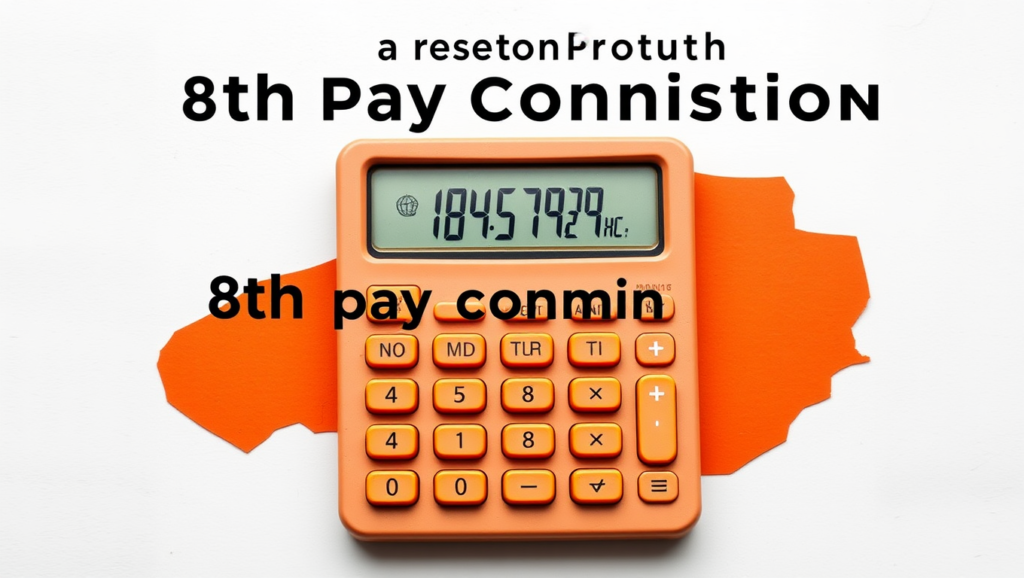Introduction
The 8th Pay Commission has become a hot topic among central government employees in India. As discussions about potential salary increases and changes to the pay structure circulate, it’s crucial to understand what this commission might mean for government staff. In this article, we’ll explore the latest news, potential benefits, and key aspects of the 8th Pay Commission.
What is the 8th Pay Commission?
The 8th Pay Commission is expected to be the next major revision of salaries and benefits for central government employees in India. Following the pattern of previous pay commissions, it aims to review and recommend changes to the existing pay structure, taking into account factors such as inflation, economic conditions, and the overall welfare of government employees.

Expected Changes in Salary Structure
One of the primary focuses of the 8th Pay Commission will likely be revising the salary structure for central government employees. This may include:
- Adjustments to basic pay
- Changes in allowances and benefits
- Introduction of new pay levels or grades
- Modifications to the existing pay matrix
While the exact changes are yet to be determined, many employees are eager to understand how these revisions might affect their take-home pay.
8th Pay Commission Fitment Factor
The fitment factor is a crucial component in determining the salary increase under new pay commissions. It’s used to multiply the existing basic pay to arrive at the new pay level. For example:
- 6th Pay Commission fitment factor: 1.86
- 7th Pay Commission fitment factor: 2.57
Speculation about the 8th Pay Commission fitment factor is rife, with some sources suggesting it could be as high as 2.28 or even 3.0. However, it’s important to note that these are merely projections, and the actual fitment factor will be determined by the commission based on various economic factors.

Try this 8th Pay Commission Salary calculator

Potential Salary Increase
While the exact salary increase under the 8th Pay Commission is yet to be determined, many government employees are hopeful for a significant boost. Factors that may influence the salary hike include:
- Inflation rates
- Cost of living in different parts of India
- Performance of the Indian economy
- Government’s fiscal position
It’s worth noting that previous pay commissions have typically resulted in substantial increases. For instance, the 7th Pay Commission led to an average salary increase of 14-15% for central government employees.
8th Pay Commission Pay Matrix
The pay matrix is a crucial component of the salary structure for government employees. It determines the pay levels and corresponding basic pay for different grades and positions. The 8th Pay Commission is expected to introduce a new pay matrix or modify the existing one.
Key points about the potential new pay matrix:
- It may include more pay levels to accommodate various job roles
- The gap between pay levels could be adjusted
- New allowances or benefits might be introduced
- Some existing allowances may be merged or revised
View the current pay matrix for reference

Implementation Date and Timeline
One of the most frequently asked questions about the 8th Pay Commission is when it will be implemented. While no official date has been announced, based on past patterns, some predictions can be made:
- The 7th Pay Commission was implemented in 2016
- Typically, pay commissions are formed every 10 years
- Following this pattern, the 8th Pay Commission might be expected around 2026
However, it’s important to note that these are merely estimates, and the actual implementation date will depend on various factors, including government decisions and economic conditions.
Impact on Pensions
The 8th Pay Commission is also expected to have implications for pensioners. Potential changes could include:
- Revision of pension amounts
- Changes to the formula for calculating pensions
- Introduction of new benefits for pensioners
Calculate your potential pension under the 8th Pay Commission
Latest News and Updates
As of now, there is no official announcement regarding the formation or implementation of the 8th Pay Commission. However, various news sources and government employee forums continue to discuss potential changes and speculate about its impact.
Some recent developments and discussions include:
- Debates about the need for a new pay commission in light of economic challenges
- Suggestions for alternative methods of salary revision
- Discussions about incorporating performance-based pay elements
It’s crucial to rely on official government sources for accurate information and avoid speculation.
Conclusion
The 8th Pay Commission remains a topic of great interest for central government employees in India. While many aspects of the commission are still uncertain, it’s clear that it has the potential to significantly impact salaries, benefits, and the overall welfare of government staff.
As we await official announcements and updates, it’s advisable for government employees to:
- Stay informed through reliable sources
- Prepare financially for potential changes
- Engage in discussions with colleagues and unions about expectations and concerns
Remember, the implementation of a new pay commission is a complex process that involves careful consideration of various economic and social factors. As more information becomes available, we’ll continue to provide updates on the 8th Pay Commission and its implications for government employees.
Also read: Best 5 Rural Business Ideas for Success in Rural Markets
The Best 8th Pay Commission Salary Calculator: Your Guide to Estimating Future Earnings
FAQs on 8th Pay Commission
Q: What is the 8th Pay Commission?
A: The 8th Pay Commission is a proposed committee that would review and recommend changes to the salary structure of government employees in India. However, it’s important to note that as of now, there is no official announcement or confirmation about the 8th Pay Commission.
Q: When will the 8th Pay Commission be implemented?
A: Currently, there is no official information about the implementation of the 8th Pay Commission. The government has not announced any plans or timeline for its formation or implementation. However it is ascertained that the commission will be implemented from January 2026.
Q: How much salary increase can be expected in the 8th Pay Commission?
A: Since the 8th Pay Commission has not been announced or formed, it’s not possible to predict the exact salary increase. Salary revisions, if any, would depend on various economic factors and government policies at the time of implementation. However as per various sources the fitmen factor is likely to range from 2.28 to 3.0.
Q: Will there definitely be an 8th Pay Commission?
A: Yes, as per the Government of India clarification on 16th January 2025 the formation of an 8th Pay Commission will happen sooner than expected.The government decides on the necessity of a new pay commission based on various factors, including the economic situation and the needs of government employees.
Q: How often are Pay Commissions typically formed in India?
A: Historically, Pay Commissions in India have been formed approximately every 10 years. However, this is not a fixed rule, and the government can decide to form a new commission at any time it deems necessary.
Q: What was the last Pay Commission implemented in India?
A: The 7th Pay Commission was the last one implemented in India. Its recommendations came into effect from January 1, 2016.
Q: How are Pay Commission recommendations calculated?
A: Pay Commissions consider various factors such as inflation, economic growth, government finances, and comparison with private sector salaries. They then propose new pay scales and allowances based on these considerations.
Q: Do Pay Commission recommendations apply to all government employees?
A: Pay Commission recommendations typically apply to central government employees. State governments often follow suit with similar revisions for their employees, but they are not obligated to do so.
Q: Can the government implement salary increases without a Pay Commission?
A: Yes, the government can implement salary increases or revisions without forming a Pay Commission. This can be done through other means such as Dearness Allowance adjustments or special pay packages.
Q: Where can I find official information about the 8th Pay Commission?
A: Official information about any future Pay Commission will be announced by the Government of India through official channels such as the Ministry of Finance website or Press Information Bureau. It’s advisable to rely on these sources for accurate information.





